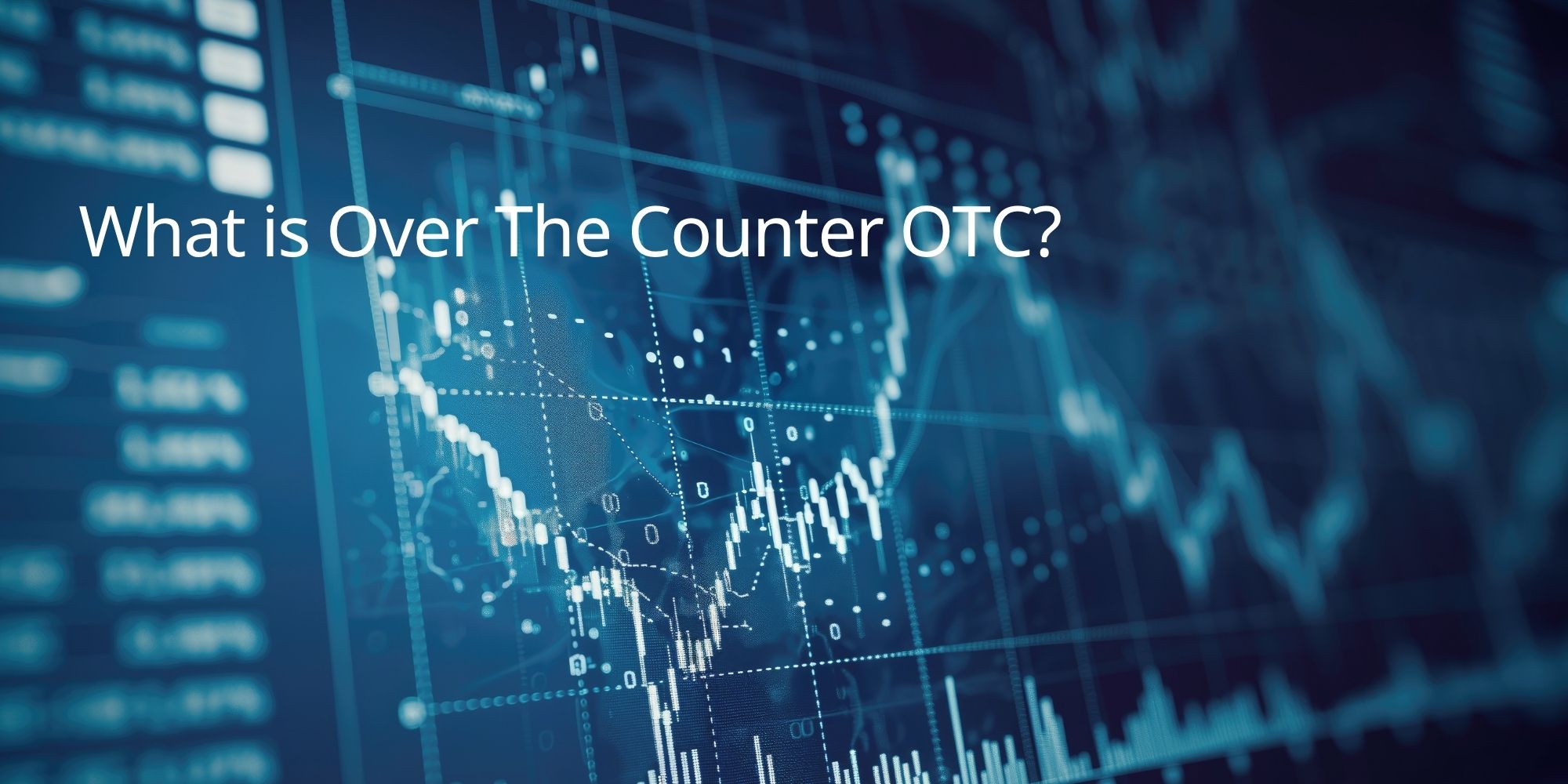What Is Over The Counter OTC?
In trading, you’ve likely encountered the term “Over-the-Counter (OTC)”, which refers to a decentralized trading system that allows financial instruments to be exchanged directly between parties, outside traditional exchanges.
For traders using PlexyTrade, understanding how OTC markets work is essential. These platforms offer greater flexibility, privacy, and accessibility, often operating beyond the limits of standard exchange hours.
This article explores how OTC markets function, their advantages, the risks involved, and how they differ from exchange-traded markets. By the end, you’ll have a clearer understanding of how OTC trading can diversify and complement your overall investment strategy.
Understanding Over-the-Counter Trading
OTC trading involves conducting transactions directly between two parties, typically through a network of brokers or dealers, rather than via a centralized exchange like the NYSE or NASDAQ.
This decentralized structure allows for customized agreements that meet the specific needs of traders and investors. OTC markets are often used for trading non-standardized financial products, instruments that may not be listed or supported by traditional exchanges.
As a result, OTC trading provides a more personalized and flexible approach, making it an essential part of modern financial markets.
Key Characteristics of OTC Markets
OTC markets stand out because of their decentralized and flexible nature. Unlike exchange-based trading, OTC transactions are negotiated privately between parties, allowing for bespoke arrangements.
- Decentralization:OTC markets are not governed by a single exchange or clearinghouse. This setup allows traders to customize contracts, including trade size, expiration dates, and other conditions, to match specific needs.
- Privacy: OTC transactions a re typically less visible to the public and do not directly impact market prices. This level of discretion can be particularly advantageous for institutional or large-volume traders who want to execute major deals without influencing broader market sentiment.
- Tailored Terms: OTC contract s are often negotiable, allowing traders to define terms around pricing, delivery, and structure, which is rarely possible in exchange-traded environments.
Benefits of OTC Trading
OTC trading offers several benefits that appeal to both institutional and retail traders:
- Customization: OTC trades can be structured to meet individual requirements, making them ideal for trading unique or less liquid instruments. This flexibility helps traders manage niche strategies or hedge specialized risks.
- Extended Trading Hours: Many OTC markets operate 24/7, allowing participants to capitalize on global opportunities and react swiftly to news or price changes outside of regular exchange hours.
- Broader Access: OTC platforms often support a wide variety of instruments, enabling traders to diversify their portfolios with products that may not be available on standard exchanges.
These benefits make OTC trading a valuable complement to exchange-based activities, especially for those seeking flexibility and market adaptability.
Risks Associated with OTC Trading
While OTC markets offer notable advantages, they also come with specific risks that traders must manage carefully:
- Counterparty Risk:This is the possibility that one party may default on its contractual obligations, since OTC transactions are not settled through a centralized exchange .
- Reduced Transparency: Because OTC trades are private, information about pricing, volume, and counterparties is often limited, leading to less market transparency compared to exchange-traded markets.
- Lower Liquidity: Some OTC instruments may trade infrequently, increasing the risk of wider spreads and price volatility, especially during periods of low demand or uncertainty.
Understanding and managing these risks through due diligence, reliable counterparties, and robust trade verification are essential when engaging in OTC markets.
How OTC Markets Differ from Exchange-Traded Markets
OTC and exchange-traded markets differ in structure, regulation, and transparency:
- Regulation:Exchange-traded markets are highly regulated and standardized, while OTC trading occurs in a less regulated environment.
- Transparency: Exchange-traded markets publicly display pricing and volume data; OTC markets operate privately between parties.
- Execution:Exchange trades occur via centralized systems with uniform contracts, while OTC trades are negotiated directly, allowing for customized terms.
These distinctions influence the strategies, risk levels, and asset types suitable for each trading environment.
Types of Instruments Traded in OTC Markets
OTC markets accommodate awide range of instruments , including:
- Currencies and Commodities: Commonly traded in global OTC networks, offering exposure to forex and raw materials.
- Stocks and Bonds are beneficial for smaller or unlisted companies that may not meet exchange listing requirements.
- Derivatives, such as forwards, swaps, and options, are customized to suit specific hedging or speculative strategies.
- Cryptocurrencies and Digital Assets: Frequently traded OTC due to their growing popularity and limited availability on traditional exchanges.
This variety makes OTC markets an attractive option for traders seeking diversification and exposure to emerging or specialized assets.
OTC Trading in Different Asset Classes
OTC trading extends across multiple asset classes, often facilitating specialized markets that require flexibility and customization.
For example, carbon credit trading, a growing area in sustainable finance, relies heavily on OTC mechanisms to tailor contract specifications and meet specific environmental standards.
Similarly, cryptocurrency OTC desks provide institutional-grade liquidity and privacy for large transactions, enabling high-value trades without disrupting market prices.
For traders exploring multi-asset opportunities, OTC markets serve as an effective gateway to broaden their exposure and build more sophisticated, diversified portfolios.
Regulatory Considerations for OTC Trading
Trading Over-the-Counter (OTC) comes with unique regulatory implications that every trader should understand. Because OTC markets are decentralized and less standardized than traditional exchanges, regulations can vary significantly across regions and asset classes.
Staying informed about jurisdictional requirements, disclosure standards, and counterparty obligations is crucial for maintaining compliance and protecting your capital. As global financial markets evolve, regulators continue to refine their oversight of OTC products, making awareness of these frameworks essential for responsible and secure trading.
The Role of Brokers in OTC Markets
Brokers are central to the functioning of OTC markets. Acting as intermediaries, they facilitate transactions between buyers and sellers, help match orders, and often provide access to market data and insights that may not be readily available elsewhere.
When participating in OTC trading, choosing the right broker is one of the most important steps you can take. A reliable broker:
- Operates under a recognized regulatory jurisdiction, ensuring greater transparency and client protection.
- Provides access to competitive spreads, efficient order execution, and liquidity for a wide range of instruments.
- Offers educational tools and resources that help traders make informed decisions.
At PlexyTrade, we encourage traders to work only with reputable, regulated brokers, as this minimizes the risks associated with decentralized trading environments and enhances overall trading confidence.
Choosing the Right OTC Broker
Selecting a suitable OTC broker requires careful evaluation of their regulatory standing, reputation, and service quality. Here are key factors to consider:
- Regulation and Jurisdiction: Ensure your broker operates under the supervision of credible financial authorities. This helps safeguard your funds and ensures fair trading practices.
- Reputation and Transparency: Review client feedback, industry certifications, and the broker’s track record within OTC markets.
- Service Offerings:Evaluate th e range of instruments available, platform stability, and the broker’s pricing model, including spreads, commissions, and execution speed.
- Support and Education: A strong broker provides not only execution services but also ongoing support, tutorials, and analytical tools to help traders refine their strategies.
At PlexyTrade, we help traders align their trading style with the right broker, ensuring access to regulated, efficient, and reliable OTC markets while maintaining confidence and control over their trades.
Conclusion
The Over-the-Counter (OTC) market offers traders a world of opportunity beyond traditional exchanges, providing greater flexibility, privacy, and customization. From currencies and commodities to niche derivatives, OTC trading provides access to a diverse range of instruments and 24/7 global markets.
However, the same decentralization that enables this flexibility also introduces risks, such as counterparty exposure and reduced transparency. Understanding these challenges and partnering with a regulated, reputable broker is key to navigating OTC trading safely.
At PlexyTrade, we guide traders in leveraging OTC markets responsibly by combining technical insight, sound risk management, and trusted partnerships. With the right approach and broker, OTC trading can become a powerful addition to your diversified trading strategy.















